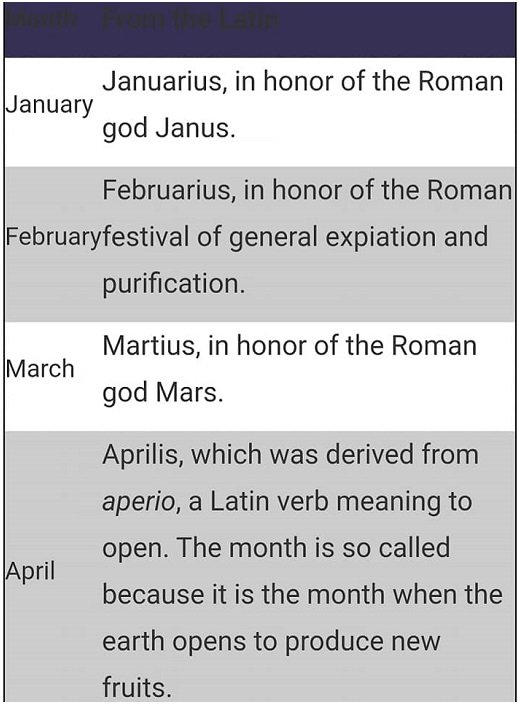𝐌𝐨𝐧𝐭𝐡 𝐍𝐚𝐦𝐞𝐬 𝐚𝐧𝐝 𝐓𝐡𝐞𝐢𝐫 𝐑𝐨𝐦𝐚𝐧 𝐎𝐫𝐢𝐠𝐢𝐧𝐬
Mohamad Mostafa Nassar
Twitter@NassarMohamadMR

- 𝐉𝐚𝐧𝐮𝐚𝐫𝐲 𝐢𝐬 “𝐭𝐡𝐞 𝐦𝐨𝐧𝐭𝐡 𝐨𝐟 𝐉𝐚𝐧𝐮𝐬” 𝐭𝐡𝐞 𝐑𝐨𝐦𝐚𝐧 𝐠𝐨𝐝 𝐨𝐟 𝐛𝐞𝐠𝐢𝐧𝐧𝐢𝐧𝐠𝐬 𝐚𝐧𝐝 𝐞𝐧𝐝𝐢𝐧𝐠𝐬. 𝐉𝐚𝐧𝐮𝐬 𝐩𝐫𝐞𝐬𝐢𝐝𝐞𝐝 𝐨𝐯𝐞𝐫 𝐝𝐨𝐨𝐫𝐬 𝐚𝐧𝐝 𝐠𝐚𝐭𝐞𝐬—𝐚𝐩𝐩𝐫𝐨𝐩𝐫𝐢𝐚𝐭𝐞 𝐟𝐨𝐫 𝐭𝐡𝐞 𝐛𝐞𝐠𝐢𝐧𝐧𝐢𝐧𝐠 𝐨𝐟 𝐭𝐡𝐞 𝐲𝐞𝐚𝐫. 𝐈𝐧𝐝𝐞𝐞𝐝, 𝐉𝐚𝐧𝐮𝐬 𝐰𝐚𝐬 𝐮𝐬𝐮𝐚𝐥𝐥𝐲 𝐝𝐞𝐩𝐢𝐜𝐭𝐞𝐝 𝐰𝐢𝐭𝐡 𝐟𝐚𝐜𝐞𝐬 𝐥𝐨𝐨𝐤𝐢𝐧𝐠 𝐛𝐚𝐜𝐤𝐰𝐚𝐫𝐝 𝐚𝐧𝐝 𝐟𝐨𝐫𝐰𝐚𝐫𝐝, 𝐚𝐬 𝐢𝐬 𝐜𝐡𝐚𝐫𝐚𝐜𝐭𝐞𝐫𝐢𝐬𝐭𝐢𝐜 𝐨𝐟 𝐚 𝐧𝐞𝐰 𝐲𝐞𝐚𝐫.
- 𝐅𝐞𝐛𝐫𝐮𝐚𝐫𝐲, “𝐭𝐡𝐞 𝐦𝐨𝐧𝐭𝐡 𝐨𝐟 𝐜𝐥𝐞𝐚𝐧𝐬𝐢𝐧𝐠,” 𝐢𝐬 𝐝𝐞𝐫𝐢𝐯𝐞𝐝 𝐟𝐫𝐨𝐦 𝐟𝐞𝐛𝐫𝐮𝐚, 𝐭𝐡𝐞 𝐧𝐚𝐦𝐞 𝐨𝐟 𝐚 𝐑𝐨𝐦𝐚𝐧 𝐩𝐮𝐫𝐢𝐟𝐢𝐜𝐚𝐭𝐢𝐨𝐧 𝐟𝐞𝐬𝐭𝐢𝐯𝐚𝐥 𝐡𝐞𝐥𝐝 𝐨𝐧 𝐭𝐡𝐞 𝟏𝟓𝐭𝐡 𝐨𝐟 𝐭𝐡𝐢𝐬 𝐦𝐨𝐧𝐭𝐡.
- 𝐌𝐚𝐫𝐜𝐡 𝐢𝐬 𝐧𝐚𝐦𝐞𝐝 𝐚𝐟𝐭𝐞𝐫 𝐭𝐡𝐞 𝐠𝐨𝐝 𝐨𝐟 𝐰𝐚𝐫 𝐚𝐧𝐝 𝐚 𝐩𝐥𝐚𝐧𝐞𝐭: 𝐌𝐚𝐫𝐬. 𝐈𝐧 𝐚𝐧𝐜𝐢𝐞𝐧𝐭 𝐑𝐨𝐦𝐞, 𝐬𝐞𝐯𝐞𝐫𝐚𝐥 𝐟𝐞𝐬𝐭𝐢𝐯𝐚𝐥𝐬 𝐨𝐟 𝐌𝐚𝐫𝐬 𝐭𝐨𝐨𝐤 𝐩𝐥𝐚𝐜𝐞 𝐢𝐧 𝐌𝐚𝐫𝐜𝐡 𝐛𝐞𝐜𝐚𝐮𝐬𝐞 𝐭𝐡𝐚𝐭 𝐰𝐚𝐬 𝐭𝐡𝐞 𝐞𝐚𝐫𝐥𝐢𝐞𝐬𝐭 𝐦𝐨𝐧𝐭𝐡 𝐨𝐟 𝐭𝐡𝐞 𝐲𝐞𝐚𝐫 𝐰𝐡𝐞𝐧 𝐭𝐡𝐞 𝐰𝐞𝐚𝐭𝐡𝐞𝐫 𝐰𝐚𝐬 𝐦𝐢𝐥𝐝 𝐞𝐧𝐨𝐮𝐠𝐡 𝐭𝐨 𝐬𝐭𝐚𝐫𝐭 𝐚 𝐰𝐚𝐫. 𝐀𝐭 𝐨𝐧𝐞 𝐭𝐢𝐦𝐞, 𝐌𝐚𝐫𝐜𝐡 𝐰𝐚𝐬 𝐭𝐡𝐞 𝐟𝐢𝐫𝐬𝐭 𝐦𝐨𝐧𝐭𝐡 𝐢𝐧 𝐭𝐡𝐞 𝐑𝐨𝐦𝐚𝐧 𝐜𝐚𝐥𝐞𝐧𝐝𝐚𝐫. 𝐓𝐡𝐞 𝐑𝐨𝐦𝐚𝐧𝐬 𝐜𝐡𝐚𝐧𝐠𝐞𝐝 𝐭𝐡𝐞 𝐨𝐫𝐝𝐞𝐫 𝐨𝐟 𝐦𝐨𝐧𝐭𝐡𝐬 𝐬𝐞𝐯𝐞𝐫𝐚𝐥 𝐭𝐢𝐦𝐞𝐬 𝐛𝐞𝐭𝐰𝐞𝐞𝐧 𝐭𝐡𝐞 𝐟𝐨𝐮𝐧𝐝𝐢𝐧𝐠 𝐨𝐟 𝐑𝐨𝐦𝐞 𝐚𝐧𝐝 𝐭𝐡𝐞 𝐟𝐚𝐥𝐥 𝐨𝐟 𝐭𝐡𝐞 𝐑𝐨𝐦𝐚𝐧 𝐄𝐦𝐩𝐢𝐫𝐞.
- 𝐀𝐩𝐫𝐢𝐥 𝐢𝐬 𝐟𝐫𝐨𝐦 𝐭𝐡𝐞 𝐋𝐚𝐭𝐢𝐧 𝐀𝐩𝐫𝐢𝐥𝐥𝐢𝐬, 𝐰𝐡𝐢𝐜𝐡 𝐢𝐬 𝐚 𝐝𝐞𝐫𝐢𝐯𝐚𝐭𝐢𝐯𝐞 𝐨𝐟 𝐭𝐡𝐞 𝐋𝐚𝐭𝐢𝐧 𝐛𝐚𝐬𝐞 𝐚𝐩𝐞𝐫𝐨-, 𝐦𝐞𝐚𝐧𝐢𝐧𝐠 “𝐬𝐞𝐜𝐨𝐧𝐝.” 𝐀𝐩𝐫𝐢𝐥 𝐰𝐚𝐬 𝐧𝐚𝐦𝐞𝐝 𝐚𝐬 𝐬𝐮𝐜𝐡 𝐛𝐞𝐜𝐚𝐮𝐬𝐞 𝐨𝐟 𝐭𝐡𝐞 𝐭𝐰𝐞𝐚𝐤𝐢𝐧𝐠 𝐨𝐟 𝐭𝐡𝐞 𝐚𝐧𝐜𝐢𝐞𝐧𝐭 𝐑𝐨𝐦𝐚𝐧 𝐜𝐚𝐥𝐞𝐧𝐝𝐚𝐫, 𝐰𝐡𝐞𝐫𝐞 𝐀𝐩𝐫𝐢𝐥 𝐰𝐚𝐬 𝐭𝐡𝐞 𝐬𝐞𝐜𝐨𝐧𝐝 𝐦𝐨𝐧𝐭𝐡.
- 𝐌𝐚𝐲 𝐬𝐩𝐫𝐢𝐧𝐠𝐬 𝐟𝐫𝐨𝐦 𝐭𝐡𝐞 𝐆𝐫𝐞𝐞𝐤 𝐠𝐨𝐝𝐝𝐞𝐬𝐬 𝐌𝐚𝐢𝐚, 𝐝𝐚𝐮𝐠𝐡𝐭𝐞𝐫 𝐨𝐟 𝐀𝐭𝐥𝐚𝐬 𝐚𝐧𝐝 𝐦𝐨𝐭𝐡𝐞𝐫 𝐨𝐟 𝐇𝐞𝐫𝐦𝐞𝐬. 𝐒𝐡𝐞 𝐰𝐚𝐬 𝐚 𝐧𝐮𝐫𝐭𝐮𝐫𝐞𝐫 𝐚𝐧𝐝 𝐚𝐧 𝐞𝐚𝐫𝐭𝐡 𝐠𝐨𝐝𝐝𝐞𝐬𝐬, 𝐰𝐡𝐢𝐜𝐡 𝐜𝐞𝐫𝐭𝐚𝐢𝐧𝐥𝐲 𝐞𝐱𝐩𝐥𝐚𝐢𝐧𝐬 𝐡𝐞𝐫 𝐜𝐨𝐧𝐧𝐞𝐜𝐭𝐢𝐨𝐧 𝐰𝐢𝐭𝐡 𝐭𝐡𝐢𝐬 𝐬𝐩𝐫𝐢𝐧𝐠𝐭𝐢𝐦𝐞 𝐦𝐨𝐧𝐭𝐡, 𝐰𝐡𝐞𝐧 𝐟𝐥𝐨𝐰𝐞𝐫𝐬 𝐚𝐧𝐝 𝐜𝐫𝐨𝐩𝐬 𝐛𝐮𝐫𝐬𝐭 𝐟𝐨𝐫𝐭𝐡.
- 𝐉𝐮𝐧𝐞 𝐝𝐞𝐬𝐜𝐞𝐧𝐝𝐬 𝐟𝐫𝐨𝐦 𝐉𝐮𝐧𝐨, 𝐰𝐢𝐟𝐞 𝐨𝐟 𝐉𝐮𝐩𝐢𝐭𝐞𝐫, 𝐚𝐧𝐝 𝐭𝐡𝐞 𝐑𝐨𝐦𝐚𝐧 𝐚𝐧𝐜𝐢𝐞𝐧𝐭 𝐠𝐨𝐝𝐝𝐞𝐬𝐬 𝐨𝐟 𝐦𝐚𝐫𝐫𝐢𝐚𝐠𝐞 𝐚𝐧𝐝 𝐜𝐡𝐢𝐥𝐝𝐛𝐢𝐫𝐭𝐡.
- 𝐉𝐮𝐥𝐲 𝐰𝐚𝐬 𝐧𝐚𝐦𝐞𝐝 𝐢𝐧 𝐡𝐨𝐧𝐨𝐫 𝐨𝐟 𝐉𝐮𝐥𝐢𝐮𝐬 𝐂𝐚𝐞𝐬𝐚𝐫 𝐫𝐢𝐠𝐡𝐭 𝐚𝐟𝐭𝐞𝐫 𝐡𝐢𝐬 𝐚𝐬𝐬𝐚𝐬𝐬𝐢𝐧𝐚𝐭𝐢𝐨𝐧 𝐢𝐧 𝟒𝟒 𝐁.𝐂., 𝐰𝐢𝐭𝐡 𝐉𝐮𝐥𝐲 𝐛𝐞𝐢𝐧𝐠 𝐭𝐡𝐞 𝐦𝐨𝐧𝐭𝐡 𝐨𝐟 𝐡𝐢𝐬 𝐛𝐢𝐫𝐭𝐡. 𝐉𝐮𝐥𝐲 𝐢𝐬 𝐭𝐡𝐞 𝐟𝐢𝐫𝐬𝐭 𝐦𝐨𝐧𝐭𝐡 𝐢𝐧 𝐭𝐡𝐞 𝐜𝐚𝐥𝐞𝐧𝐝𝐚𝐫 𝐭𝐡𝐚𝐭 𝐛𝐞𝐚𝐫𝐬 𝐭𝐡𝐞 𝐧𝐚𝐦𝐞 𝐨𝐟 𝐚 𝐫𝐞𝐚𝐥 𝐩𝐞𝐫𝐬𝐨𝐧, 𝐫𝐚𝐭𝐡𝐞𝐫 𝐭𝐡𝐚𝐧 𝐚 𝐝𝐞𝐢𝐭𝐲.
- 𝐀𝐮𝐠𝐮𝐬𝐭 𝐫𝐞𝐩𝐫𝐞𝐬𝐞𝐧𝐭𝐬 𝐚𝐧𝐨𝐭𝐡𝐞𝐫 𝐑𝐨𝐦𝐚𝐧 𝐫𝐮𝐥𝐞𝐫 𝐡𝐚𝐯𝐢𝐧𝐠 𝐛𝐞𝐞𝐧 𝐞𝐧𝐬𝐡𝐫𝐢𝐧𝐞𝐝. 𝐈𝐧 𝟖 𝐁.𝐂., 𝐭𝐡𝐞 𝐦𝐨𝐧𝐭𝐡 𝐒𝐞𝐱𝐭𝐢𝐥𝐢𝐬 (“𝐬𝐢𝐱𝐭𝐡”) 𝐰𝐚𝐬 𝐫𝐞𝐧𝐚𝐦𝐞𝐝 𝐚𝐟𝐭𝐞𝐫 𝐀𝐮𝐠𝐮𝐬𝐭𝐮𝐬, 𝐧𝐞𝐩𝐡𝐞𝐰 𝐨𝐟 𝐉𝐮𝐥𝐢𝐮𝐬 𝐂𝐚𝐞𝐬𝐚𝐫 𝐚𝐧𝐝 𝐭𝐡𝐞 𝐟𝐢𝐫𝐬𝐭 𝐞𝐦𝐩𝐞𝐫𝐨𝐫 𝐨𝐟 𝐑𝐨𝐦𝐞. 𝐓𝐡𝐞 𝐞𝐦𝐩𝐞𝐫𝐨𝐫’𝐬 𝐧𝐚𝐦𝐞 𝐜𝐚𝐦𝐞 𝐟𝐫𝐨𝐦 𝐭𝐡𝐞 𝐋𝐚𝐭𝐢𝐧 𝐚𝐮𝐠𝐮𝐬𝐭𝐮𝐬, 𝐰𝐡𝐢𝐜𝐡 𝐠𝐚𝐯𝐞 𝐫𝐢𝐬𝐞 𝐭𝐨 𝐭𝐡𝐞 𝐚𝐝𝐣𝐞𝐜𝐭𝐢𝐯𝐞 “𝐚𝐮𝐠𝐮𝐬𝐭,” 𝐦𝐞𝐚𝐧𝐢𝐧𝐠 “𝐫𝐞𝐬𝐩𝐞𝐜𝐭𝐞𝐝 𝐚𝐧𝐝 𝐢𝐦𝐩𝐫𝐞𝐬𝐬𝐢𝐯𝐞.”
- 𝐒𝐞𝐩𝐭𝐞𝐦𝐛𝐞𝐫, 𝐟𝐫𝐨𝐦 𝐭𝐡𝐞 𝐋𝐚𝐭𝐢𝐧 𝐬𝐞𝐩𝐭𝐞𝐦 (“𝐬𝐞𝐯𝐞𝐧”), 𝐬𝐞𝐞𝐦𝐬 𝐚𝐬 𝐢𝐟 𝐢𝐭 𝐬𝐡𝐨𝐮𝐥𝐝 𝐛𝐞 𝐭𝐡𝐞 𝐬𝐞𝐯𝐞𝐧𝐭𝐡 𝐦𝐨𝐧𝐭𝐡 𝐨𝐟 𝐭𝐡𝐞 𝐲𝐞𝐚𝐫.
- 𝐓𝐡𝐞 𝐧𝐚𝐦𝐞𝐬 𝐟𝐨𝐫 𝐎𝐜𝐭𝐨𝐛𝐞𝐫 (𝐨𝐜𝐭𝐨), 𝐍𝐨𝐯𝐞𝐦𝐛𝐞𝐫 (𝐧𝐨𝐯𝐞𝐦), 𝐚𝐧𝐝 𝐃𝐞𝐜𝐞𝐦𝐛𝐞𝐫 (𝐝𝐞𝐜𝐞𝐦) 𝐬𝐮𝐠𝐠𝐞𝐬𝐭 𝐭𝐡𝐚𝐭 𝐭𝐡𝐞𝐲 𝐰𝐨𝐮𝐥𝐝 𝐛𝐞 𝐭𝐡𝐞 𝐞𝐢𝐠𝐡𝐭𝐡, 𝐧𝐢𝐧𝐭𝐡, 𝐚𝐧𝐝 𝐭𝐞𝐧𝐭𝐡 𝐦𝐨𝐧𝐭𝐡𝐬. 𝐀𝐧𝐝 𝐭𝐡𝐞𝐲 𝐨𝐧𝐜𝐞 𝐰𝐞𝐫𝐞, 𝐰𝐡𝐞𝐧 𝐭𝐡𝐞 𝐑𝐨𝐦𝐚𝐧 𝐥𝐮𝐧𝐚𝐫 𝐜𝐚𝐥𝐞𝐧𝐝𝐚𝐫 𝐬𝐭𝐚𝐫𝐭𝐞𝐝 𝐭𝐡𝐞 𝐲𝐞𝐚𝐫 𝐢𝐧 𝐌𝐚𝐫𝐜𝐡 𝐚𝐭 𝐡𝐚𝐫𝐯𝐞𝐬𝐭 𝐭𝐢𝐦𝐞.
𝐁𝐮𝐭 𝐚𝐥𝐥 𝐭𝐡𝐚𝐭 𝐜𝐡𝐚𝐧𝐠𝐞𝐝 𝐢𝐧 𝟒𝟔 𝐁.𝐂., 𝐰𝐡𝐞𝐧 𝐉𝐚𝐧𝐮𝐚𝐫𝐲 𝐛𝐞𝐜𝐚𝐦𝐞 𝐭𝐡𝐞 𝐟𝐢𝐫𝐬𝐭 𝐦𝐨𝐧𝐭𝐡 𝐨𝐟 𝐭𝐡𝐞 𝐧𝐞𝐰 𝐉𝐮𝐥𝐢𝐚𝐧 𝐜𝐚𝐥𝐞𝐧𝐝𝐚𝐫, 𝐦𝐚𝐤𝐢𝐧𝐠 𝐒𝐞𝐩𝐭𝐞𝐦𝐛𝐞𝐫 𝐭𝐡𝐫𝐨𝐮𝐠𝐡 𝐃𝐞𝐜𝐞𝐦𝐛𝐞𝐫 𝐭𝐡𝐞 𝐧𝐢𝐧𝐭𝐡–𝐭𝐰𝐞𝐥𝐟𝐭𝐡 𝐦𝐨𝐧𝐭𝐡𝐬 𝐨𝐟 𝐭𝐡𝐞 𝐲𝐞𝐚𝐫.

𝐀𝐥𝐥𝐚𝐡 𝐊𝐧𝐨𝐰𝐬 𝐁𝐞𝐬𝐭
𝐑𝐞𝐟𝐞𝐫𝐞𝐧𝐜𝐞𝐬:
The Mythic Origins of Christianity: How Is Christianity Similar to Pagan Religions?
Pagan Roots of the Trinity Doctrine
What’s in a name? Months of the year
Pagan origins of English weekday names
Can Muslims Celebrate Christmas?
Twelve Christmas Traditions With Pagan Origins
The Pagan Roots of Good Friday
Is Good Friday a pagan holiday?
Satna Claus the Great Imposter
Origin of Easter: From pagan festivals and Christianity to bunnies and chocolate eggs
Did Allah deceive Christians by allowing a substitute person on the Cross?
Easter Story Found in Qur’an? Nope
Origin of Easter: From pagan festivals and Christianity to bunnies and chocolate eggs